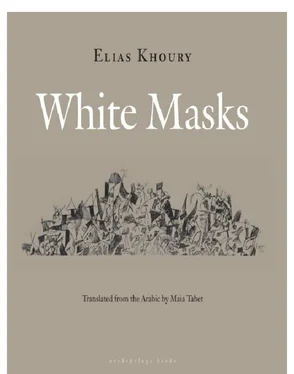She assumed that he was brazen enough to smoke and to drink coffee because no one was home. In any case, she got up. As she filled the coffee pot with water from the tap at the kitchen sink, she felt his hand tremblingly reach for hers. How soft his fingers were under the water!. . Fatimah felt the blood rushing to her eyes. He stood so close behind her that she could feel his warm breath on her neck, but she didn’t dare turn around. She felt him draw closer and the burning sensation in her eyes sharpened. Not even realizing how or why, she drew her hand away and spun around, dropping the coffee pot into the sink. A shudder ran through his body as he stepped back.
“With just a hint of sugar, please.”
And he left the kitchen.
She refilled the coffee pot, lit the gas burner and stood watching over it: first, the bubbles rising to the surface as the water came to the boil, and then the coffee cascading down, mingling with the water, and finally dissolving. She stood there expectantly — with an almost liquid sensation of fear seeping from her belly — and waited for him, expecting him to come back. But he didn’t.
She poured the coffee, set the cup on a brass tray, placed beside it a glass which she filled with water, and then carried the tray into the living room. He was sitting, one leg crossed over the other, reading the paper. He neither looked up nor turned to her. He did not say a word. She put the tray down on the table in front of him and stood there.
“Your coffee, Khawaja Fadee.”
He set the paper down very slowly, tapped a cigarette out of the white box of Kents, stood up, and came toward her.
“Cigarette. .?”
He drew closer, placed the cigarette between her lips, his hand brushing against her face. He had stepped back and bent down to pick up the matches from the table when the telephone rang. Fadee dashed to answer. Fatimah put the cigarette down on the table and went back to her room to finish the darning.
He didn’t come back. He was on the phone a long time: she could hear him, laughing and speaking in French. No, he didn’t come back. Then everyone came home, the master, the mistress, and the house filled with the din of the TV…
And now he stood there, looking away, as though he had forgotten, or as if he were afraid of meeting her gaze.
Gradually, Fatimah forgot how that burning sensation felt. Even with Mahmud it had gone, and it never came back. . and anyhow, by then she’d become burdened with Ali. Fadee was always gone, Mr. Mitri had become practically an invalid since falling out of bed and dislocating his hip, and Sitt Huda constantly went on about her cholesterol, as she grew fatter by the day.
It was Fadee who had escorted them out of the neighborhood. He came in with Mahmud one day and told them they had to leave. He’d take them as far as the Museum Crossing, he said, and there they’d be able to make their way to West Beirut in a servees taxi. Fatimah was instantly overcome by the same feeling she had when Ali fell-a stabbing pain in her gut, and nausea. She was sure that Ali hadn’t actually fallen off the roof, but her lips were paralyzed and she cried soundlessly. Looking at him, you’d think that nothing had happened — it was as if Ali weren’t his son. A monster, that’s what Mahmud was: a monster who had killed Ali! That’s what she said to herself whenever she looked over towards Ali’s photograph sitting in its black frame on top of the TV.
Anyhow, that day, the day they left, Fadee looked exactly the same as on that other fateful day: trembling from head to foot, his voice shaking as he told them they had to leave, while Mahmud stood by his side, blood gushing from the wounds on his face. .
Mahmud had told her he was going up to the roof to repair the TV antenna, and the boy had gone up with him. When Mahmud reappeared without him, she thought the boy was playing outside, but she felt uneasy nonetheless: she had worried about him ever since the day he’d come home, blood dripping from his head, telling her he’d fallen on the street and a nail had pierced his skull. And when she’d taken him to the clinic, the doctor had ridiculed her. “A nail, you say? No, that’s not possible. . he does have some abrasions though.” That’s what the doctor had said.
But the boy wasn’t the same anymore. She couldn’t pinpoint when exactly, but he had changed. His father had taken to hitting him over the head, and the shopkeeper for whom Ali worked got so exasperated he called Mahmud in to tell him about the boy’s behavior. The shopkeeper told Mahmud that, one day, when he had asked the boy to make him a cup of coffee, Ali made a brew of salt and pepper instead of coffee and sugar. And then Ali started eating pepper all the time and he stopped going over to the shop to work. He also hit his brothers and sisters, as well as other children from the neighborhood.
Sitt Huda told her she should take him to the doctor because the boy wasn’t normal. But Fatimah wouldn’t hear of it — it’s just because of the nail, she thought. Even though one day, Ali had grabbed little George and fondled him. Mahmud told her all boys went through this, and there was no need to make such a fuss about it. Fatimah tried everything: she prayed for him, she gave him a talking-to, she even dragged him with her whenever she went to market. She’d hold his hand like a small child, but he’d break free and run wild in the street, beating up the neighborhood kids and refusing to go to work…
She asked Mahmud where the boy was. He said Ali was still up there.
“Up where?”
“On the roof.”
“And what’s he doing there?”
“Playing.”
“How could you leave him up there? The boy is not well!”
“He wouldn’t come down with me, so I left him.”
Fatimah ran; the elevator was out of order, so she started up the stairs. And then she heard the screaming and the wailing. Stopping dead in her tracks, she didn’t know whether to continue on up or go back down. Then, she heard Mahmud bellowing and a terrible commotion breaking out below, so she raced back down: the boy was like pulp, nothing but a mass of blood, broken limbs, and clothes. And when she glanced up, there was Fadee, looking like nothing she’d ever seen before: screaming and crying simultaneously, his whole body shook and shuddered; then he bent down and picked up the boy and ran with him to the hospital.
Everyone said Ali had fallen. Mahmud said he’d killed himself. “He’s found his rest and so have we. . you know, I saw him trying to rub up against his sister in bed.” That’s what Mahmud said, but Fatimah didn’t believe him.
How could she? As far as she was concerned, it was all Mahmud’s fault: he hit the poor child over the head until he got like that. How could a fifteen-year-old want to take his own life?. . That was no suicide, Fatimah was sure, and she pounded her fists into her husband’s chest, screaming at him and accusing him of being Ali’s killer, as he, unmoved, stared at her silently through those narrow-slit eyes of his. Then he bellowed out a hamdulillah.
“God forbid, as if he weren’t our own son!”
Fadee was there. And Sitt Huda was there. Everyone was there…
At first, Fatimah hadn’t realized what was happening. It was Hussein, her second son, who had come up to Mr. Mitri’s apartment and told Sitt Huda. Then he told her.
“They came,” he said. “Men in black hoods came asking for father. . then they saw him. . they put a brown sack over his head and left. . they bundled him into a black jeep and told us we had to leave this place. .”
Fatimah raced downstairs wailing, but he was nowhere to be found. She ran out to the street, crying for help, and the neighbors looked on as if they didn’t know her. In tears, she ran back into the building, and all the children gathered around her, crying. Then, Fadee arrived: he seemed different somehow — she saw it in his eyes, the very same expression he’d had when Ali died. He came into the room, asked the children some questions, and left.
Читать дальше












